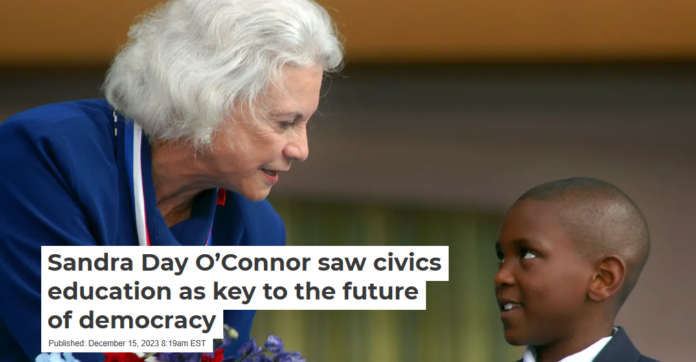

Joshua Jansa, Oklahoma State University and Eve Ringsmuth, Oklahoma State University
Beyond her trailblazing role as the first woman appointed to the U.S. Supreme Court, Justice Sandra Day O’Connor considered iCivics – a civics education nonprofit founded after she retired from the court – to be her “most important legacy.”
“The practice of democracy is not passed down through the gene pool,” O’Connor once stated. “It must be taught and learned by each new generation.”
iCivics is the toolkit she assembled to do just that. Fulfilling O’Connor’s call to action, iCivics provides games and activities designed to help students learn about American democracy. iCivics is predicated on getting students to actively apply what they’re learning through interaction and simulation. The website serves 9 million students annually, in all 50 states.
O’Connor’s dedication to civics education was motivated by her keen awareness of its vital importance. She once noted, “Without basic civic education, we cannot expect to preserve or improve our system of government.”
As researchers who examine the impact of civics coursework, we agree. The evidence shows that civics education generally – and the iCivics initiative specifically – has proven an effective tool for preparing citizens, especially when instructors get their students to actively engage with the material and one another.
One study found that elementary, middle and high school students exhibited substantial growth in political knowledge after interacting with iCivics for just 30 minutes twice per week.

While iCivics targets K-12 students, O’Connor considered the need for civics education to extend more broadly. She once observed that polls have shown that only a third of the public could name the three branches of government. “Compare that to the … nearly three-quarters who can name two of the Three Stooges, and the numbers are disheartening,” O’Connor stated.
The quest for what works
Like O’Connor, we are interested in identifying strategies for effective instruction. We study civics education at the college level. Specifically, we survey the thousands of students who take Introduction to American Government – a required general education and foundational civics education course -— each year at Oklahoma State University. We ask students to answer basic political knowledge questions at the beginning and end of each semester. We also ask students to assess their confidence in understanding politics and their ability to effectively participate.
While students who take Introduction to American Government grow significantly in their belief that they can understand and effectively engage with the political process, we find that – similar to the impact of iCivics activities – students experienced even more growth when their instructors used strategies that were actively engaging. These strategies include analyzing data and current events, group discussions and posting on online discussion boards.
Like others, our analyses also show students gain knowledge about government and politics through civics coursework. Importantly, these outcomes and civics education more generally have been shown to be significant predictors of future political participation. This includes regularly talking politics with peers, voting, petitioning and protesting.
Our research also uncovers that there is flexibility in how to deliver effective civics education. Online classes promote as much or greater gains for students. Additionally, instructors can use technology to ensure learning about democracy persists even if the class format must shift unexpectedly, such as from in person to online.
Broader research from the middle, high school and college levels, and across formats, echoes these findings. Giving students opportunities to actively apply course material and engage with peers equips them with the knowledge and skills to be active citizens.
Changing futures
Civics education is especially useful for lifting students who did not grow up talking about politics and discussing its importance onto equal footing with those who did. Women and racial and ethnic minorities, for example, are on average less likely to be socialized by parents into learning about and taking part in politics. Civics education can compensate for these disparities, creating a pathway for all to understand how government works and how they can take part.
O’Connor was committed to empowering and engaging young citizens through civics education. She noted, “We have a complex system of government. You have to teach it to every generation. We want young people to continue to be part of it. We need ’em more than ever.”
Though O’Connor made those comments in 2012, the need to encourage participation among younger generations persists. A recent poll indicates that the number of young Americans planning to vote in 2024 may be lower than in the 2020 election.
With more and more young Americans questioning whether it is essential to live in a democracy, O’Connor’s efforts to increase access to civics education continue to light a path forward on how to reinvigorate democracy in the U.S.
Joshua Jansa, Associate Professor of Political Science, Oklahoma State University and Eve Ringsmuth, Associate Professor of Political Science, Oklahoma State University
This article is republished from The Conversation under a Creative Commons license. Read the original article.



















